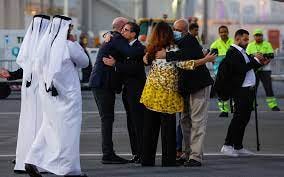Five imprisoned Americans departed Iran on Monday en route to Washington, D.C. via Doha, Qatar, along with two of their family members.
“We have received confirmation that the 5 freed Americans and 2 American family members are wheels up in Tehran and en route to Doha,” a senior U.S. administration official said Monday.
The seven Americans who departed Iran on a Qatari plane as part of the deal include businessman Siamak Namazi, 51, who has been imprisoned in Iran’s Evin prison for eight years; businessman Emad Shargi, 59; British-born businessman and wildlife conservationist Morad Tahbaz, 67, both also held in Evin; as well as two other Iranian American individuals whose families did not yet wish their names to be publicly released. In addition, Siamak Namazi’s mother, Effie Namazi, and Morad Tahbaz’s wife, Vida Tahbaz, were allowed to leave Iran with their loved ones.
As part of the painstakingly negotiated arrangement, mediated with the assistance of Qatar over the past several months, five Iranian nationals charged in the United States for non-violent offenses were due to receive clemency. In addition, six billion dollars in Iranian funds held in bank accounts in South Korea were transferred to a bank account in Qatar, where the funds can be used for humanitarian, non-sanctionable transactions, such as food and medicine.
President Joe Biden, currently in New York for the opening session of the UN General Assembly, welcomed the release of the Americans, and thanked Qatar among other countries for its extensive help in the efforts to negotiate the deal.
“Today, five innocent Americans who were imprisoned in Iran are finally coming home,” Biden said in a statement.
“I give special thanks to the Emir of Qatar, Sheikh Tamim bin Hamad, and to the Sultan of Oman, Haitham bin Tariq, both of whom helped facilitate this agreement over many months of difficult and principled American diplomacy,” Biden said.
“As we celebrate the return of these Americans, we also remember those who did not return,” Biden’s statement continued. “I call on the Iranian regime to give a full account of what happened to Bob Levinson. The Levinson family deserves answers.”
Both US hostage envoy Roger Carstens and acting US Special Envoy for Iran Abram Paley were on hand in Doha on Monday to receive the released Americans. The plan was for a brief stop over in Doha before flying on to Washington.
U.S. officials said the release of the five wrongfully detained Americans will make their families whole after years of torment, but does not change the trajectory of U.S. relations with Iran.
“We're returning five American citizens to their families after years of torment,” a senior U.S. administration official said on a call with reporters Sunday night, speaking on background to describe what they expected to unfold.
“Importantly,” he continued, “this deal has not changed our relationship with Iran in any way. Iran is an adversary and a state sponsor of terrorism. We will hold them accountable wherever possible.”
As a signal of that, the United States was expected to sanction two additional Iranian entities on Monday, including on Iran’s Ministry of Intelligence. They would be just the latest in some four hundred Iranian sanction designations the Biden administration has issued since it came into office in 2021 seeking to revive the 2015 Iran nuclear deal, which Trump quit in 2018. But that hasn’t happened, and U.S. officials indicated they had no expectations for direct talks with Iran on the sidelines of the UN General Assembly getting underway in New York this week, which both Biden and Iranian President Ebrahim Raisi will be attending.
“You asked if there's any talks planned this week? Absolutely not,” the senior US administration official said. “We do not close the door entirely to diplomacy. But we approach diplomacy with principled and standards, and if we see an opportunity, we will explore it, but right now I've really nothing to talk about.”
(An Iraniann offiial, asked about the prospect of direct U.S. Iran talks, said, “G-d knows.”)
“We are focused daily on a policy for the Middle East that combines deterrence with diplomacy to reduce the risk of Iran's aggression, …de-escalates conflicts through diplomacy wherever possible, and contributing and building a more stable integrated prosperous Middle East region,” the US official said. “But it goes without saying that when we have an opportunity to bring American citizens home, we do seek to seize it and that's what we're doing here.
“The President is making five families whole again,” the U.S. offiocial said. “That's ultimately what this is about.”
Siamak Namazi, in a statement released upon his handover to U.S. officials in Doha, said his joy at his impending reunion with his family was mixed with sorrow for Iran’s political prisoners.
“I find my ineffable joy of my forthcoming reunification with my family is laced with sorrow – a painful and deep feeling of guilt for taking my breaths in freedom while so many courageous individuals that I love and admire continue languishing behind those walls,” Namazi said. “They are detained for demanding the dignity and freedom that every human being is inherently entitled to; for reporting the truth; for worshipping their God; for being a woman. For nothing.
“All the political prisoners of Iran, a country where the indomitable courage of women leaves us in awe, deserve their liberty,” he said.
**


